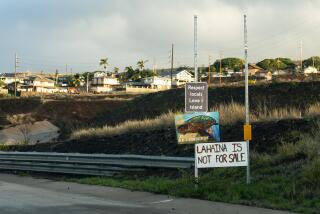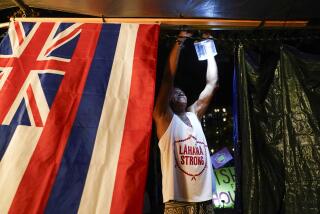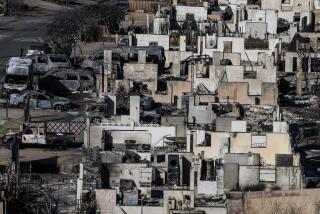Japanese Speculation in Hawaiian Land Scored : Honolulu Mayor Charges That Investing in Real Estate Without Creating Jobs Could Bring a ‘Violent’ Reaction
- Share via
TOKYO — Mayor Frank Fasi of Honolulu warned Japan on Tuesday that a continuing wave of speculative Japanese investment in Hawaiian real estate will spur “a violent reaction, a nationalistic reaction.”
“That won’t be good for your country,” he told reporters at the Japan National Press Club.
Fasi, a Republican who in November will seek a fifth term, said Hawaii’s Democratic governor and its Democratic legislature have refused to take any action against speculative Japanese investment because they regard his complaints as “a campaign gimmick.”
“But I have gotten their attention,” he said. “People are now talking about the problem.”
Fasi insisted that he and the state of Hawaii “still welcome Japanese investors who create quality jobs.” What they do not welcome, he added, is the real estate speculator.
He complained that Japanese invested $3.3 billion in Hawaii last year, to bring their cumulative investment there to $7.24 billion, exceeding their cumulative investment of $7.02 billion in California.
Japanese investment in California, he said, is the equivalent of $300 for every resident, but in Hawaii it amounts to $7,500 for every resident.
“When too much money goes in too short a time into a tiny place like Hawaii, it hurts,” he said. “You can buy a thousand homes in Hawaii and have a tremendous impact. You can buy a thousand homes in California and have no impact at all.”
While acknowledging that no laws have been violated, Fasi singled out Genshiro Kawamoto, a Tokyo real estate dealer, who has bought 160 housing units on Oahu, as the type of investor who is not welcome in Hawaii. Oahu is where Honolulu is situated.
Fasi also cited examples of homes bought by Japanese and sold to other Japanese within two months at profits up to 86%. “In one section of our island, where most of the action has taken place, the average price of a single-family home went from $297,000 in 1986 to $475,800 last year, an increase of 60.2%,” he said.
For Oahu as a whole, he said, the price of the average home rose 32.3% in 1987 to $227,100.
Fasi charged that Japanese speculators “are paying huge amounts of money for agricultural land to be converted into golf courses and for commercial land.” The result, he said, is that real estate taxes, rents and the overall cost of living have all been rising.
He noted that Japanese now own hotels that account for 50% of all the hotel rooms on Waikiki Beach and 30% of all the hotel rooms on Oahu, but he said he would not object if Japanese owned all the hotels in Hawaii if they purchased the properties appropriately.
“As long as you put our people to work and it doesn’t affect the cost of living of our people, I don’t care if the owner of the hotel chain is in Tokyo or Boston,” he said.
But he criticized the quality of investments by Japanese.
“What good-quality paying jobs have they created?” he asked. “They buy our hotels already built up. They buy our golf courses. They buy our office buildings. But what kind of investment have they made to create good-paying jobs (that are) better than just service jobs--fast-food jobs, taxi drivers, hula dancers?”
He said the kind of investment he wants will create jobs for college-educated youths.
He said he does not want Japanese speculators to repeat the land-price spiral in Hawaii that they have created in Tokyo, where, he said, small plots of land in some choice locations are selling at prices that would equal $6.7 billion an acre.
Eight acres of land in downtown Tokyo, he said, would be worth an amount equal to the value of Oahu’s entire 608 square miles.
More to Read
Inside the business of entertainment
The Wide Shot brings you news, analysis and insights on everything from streaming wars to production — and what it all means for the future.
You may occasionally receive promotional content from the Los Angeles Times.









